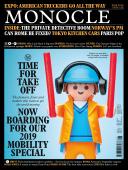
Issue 124
Time for take off! The pioneers, fixers and makers who want to get the world moving.
In This Issue
Oops! No content was found.
Looks like we no longer have content for the page you're on. Perhaps try a search?
Return Home
Daily inbox intelligence from Monocle

Time for take off! The pioneers, fixers and makers who want to get the world moving.
Looks like we no longer have content for the page you're on. Perhaps try a search?
Return Home